Ticketing often gets treated like a background process, something routine that “just works.” But if you take a closer look, it’s where your business either leaks money or quietly builds its profit margin. Every delayed sale, every manual ledger entry, every unrecorded seat is a crack in your operational foundation. And while automation isn’t new, it hasn’t been implemented in all parts of the transport industry.
Many companies still handle bookings using the old manual and error-prone procedures, like it's 2005. The irony is that the customer has already moved on to easier ways. Passengers expect instant confirmations, flexible payment modes, and accurate seat availability. When your system can’t deliver that experience, they switch, often permanently.
An online bus ticket booking system is your company’s control center. It connects fleet, finance, and customer engagement into one trackable loop. The real question is: how long can a modern transport business afford to run without an online bus ticket booking software that delivers automation and insight?
Learn how a robust Online Bus Reservation Software can streamline your operations and enhance customer experience.
How Digital Bookings Revitalize Bus Operations
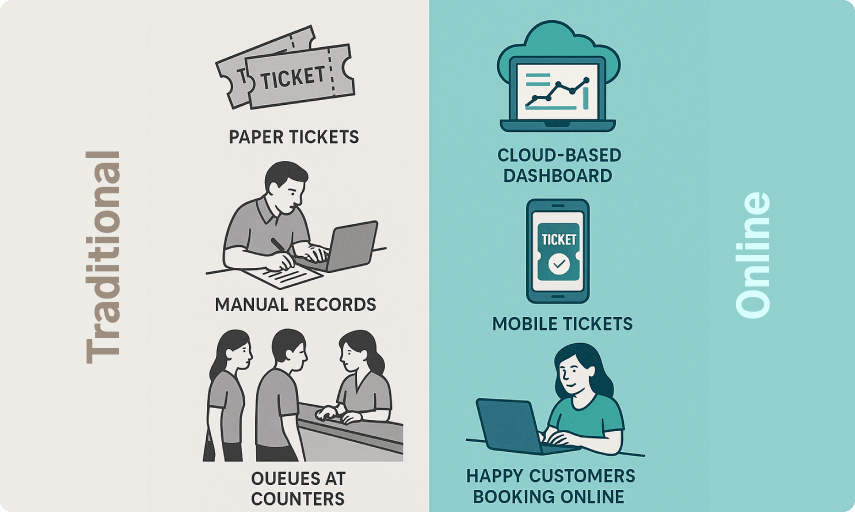
Manual ticketing is a tedious process. Cash handling creates reconciliation headaches, while queues often result in commotion. Errors in seat allocation also lead to disputes. Those are all symptoms of the same deeper issue of poor control over transactions and the overall ticketing process. You can fix that with an online bus booking system.
Digital bookings are great for throughput and visibility. When bookings happen online using a bus ticket booking software, more seats sell with less effort, thus reducing idle capacity. You also gain important knowledge about customers and routes in near real time, through an organized collection of data. This lets you test small pricing nudges, find underused runs, and reassign resources efficiently.
Consider a mid-sized operator running 30 buses. If you raise average occupancy by 5 percentage points through better visibility and dynamic holds, the added revenue compounds every day. Faster settlement cycles mean money in your bank sooner. Fewer ticket disputes free the operations team to work on punctuality and maintenance rather than chasing receipts. That is the practical arithmetic of digital ticketing driven by a modern bus booking system.
Different roles benefit in predictable ways. Owners see cleaner revenue forecasts and fewer leak points. Operations managers get accurate manifests and fewer boarding delays. Customers get faster checkouts and clearer travel confirmations. These are not abstract wins. They are measurable outcomes you can track in a month using a bus reservation system built for operators.
Explore how our bus transportation software solutions help modern operators automate and scale efficiently.
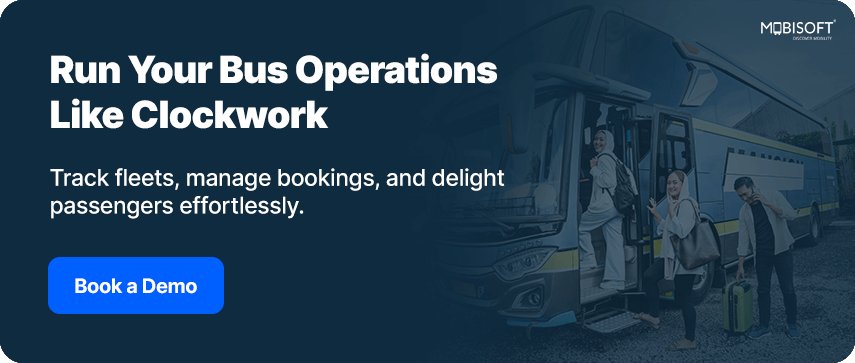
Key Features of Top Bus Booking Software
Not all platforms are equal. Ask yourself: Does the product solve real operational problems, or does it just look shiny? Here is a compact checklist of must-have capabilities and why they matter.
- Real-time seat inventory and interactive seat maps. You need instant holds and auto-release of reservations. That prevents double bookings and reduces no-shows from accidental overbooking.
- Mobile-first booking flow and responsive web widgets. Most customers will book on phones. If your flow is clumsy, conversion drops fast. Native apps for drivers or inspectors help with on-route verification.
- Multiple payment methods, automatic settlement, and a reliable refunds flow mean fewer disputes and faster accounting. Look for automated accounting exports to your finance system.
- APIs and white-label widgets allow your system to effectively communicate with other software. CRM, ERP, and GPS feeds are non-negotiable. A white-label widget lets partners sell tickets under your brand, which opens revenue without extra tech work.
- Route-level pricing rules and promotional engines. You want flexible pricing by route, seat type, or time. Campaigns should be targetable and measurable.
- Dashboards and reporting. Route profitability, occupancy trends, refund rate, and payment aging should be visible on day one.
- Security and compliance. Payment compliance, data governance, and role-based access help avoid regulatory headaches. Treat data ownership as a business asset.
These features turn an online bus booking software from a simple booking tool into a full-fledged operations platform. It becomes the place where you run experiments, measure results, and improve margins across your bus operator booking system. To explore deeper tech insights, check this article on smart bus management software benefits.
How to Select the Right Bus Ticket Booking Platform?
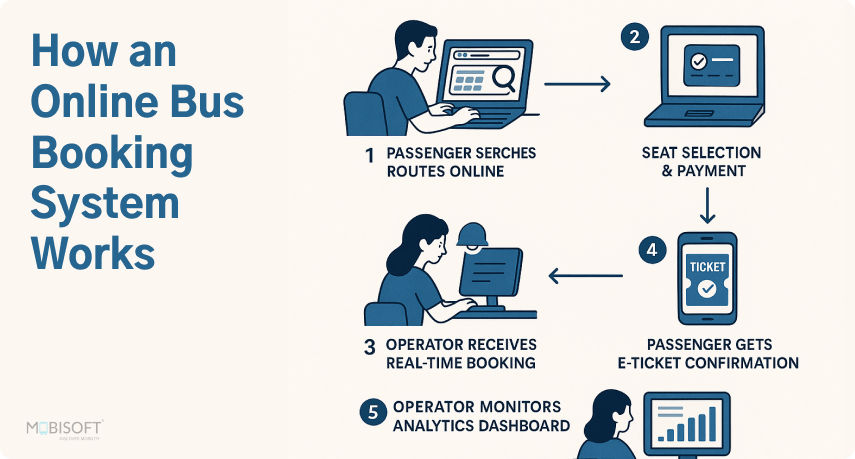
You will hear a lot of vendor promises. Test them. Here are practical evaluation points.
- APIs first - Ask for an API sandbox and a sample call. If they cannot hand you a predictable, documented endpoint for seat availability, walk away. Integration with your payment gateway and ERP must be demonstrable.
- Data portability - You must be able to export bookings, manifests, and transaction history in CSV or JSON. Clear ownership terms must be in the contract.
- SLA and uptime - Request uptime numbers and support response times. You need a published escalation path and a fallback plan for outages.
- Pricing model clarity - Compare per-ticket, per-seat, or fixed SaaS subscription models. Build a simple TCO model for one year and three years. Don’t guess. Calculate.
- Implementation timeline - Require a phased plan with milestones. Include acceptance criteria for each phase.
- Security and audit - Ask for role-based access controls, audit logs, and PCI compliance proofs if the vendor handles payments.
- Vendor track record - Check case studies for operators in markets similar to yours. Ask about integration with local payment providers if that is relevant.
A practical vendor scorecard helps objectivity. Weight features, support, pricing, compliance, and track record. Score multiple vendors and bring finance and operations into the shortlist conversation. That procedure keeps procurement honest and helps you choose the best bus ticket booking software for the travel business. Learn how digital adoption transforms decision-making in AI predictive analytics for bus transportation planning.
Practical Deployment Paths for Online Bus Ticketing
You do not flip a switch across an entire network. You mitigate risk with a conservative rollout and clear metrics.
Pilot first
Choose one high-visibility route and one low-complexity route. Run both concurrently for 30–60 days. Measure booking ratio, boarding time, refund rate, and customer complaints.
Hybrid model
Keep ticket counters open. Encourage customers to use digital channels with small incentives such as priority boarding or simple discounts. This preserves revenues while you train customers and staff.
Staff enablement
Train conductors, dispatchers, and customer service staff with short, hands-on sessions. Give them quick reference cards. Practice the easy things first, like scanning QR tickets and processing refunds.
Monitoring
Set up early alerts for failed payments, double bookings, or a sudden drop in digital conversion. Be proactive in management. Fixing small errors early prevents them from becoming large operational problems.
Scale by region
Expand to similar routes first. Then use the data to refine pricing and seat allocation logic. The aim is quick, measured scaling rather than theatrical launches that create chaos.
Explore scalable deployment options through our bus-on-demand smart transit solutions.
The Role of Bus Booking APIs in Ecosystem Growth
APIs have evolved far beyond being simple connectors. They now act as the driving force that helps transport companies extract more value from existing systems. When your bus ticketing software for operators communicates smoothly with payment gateways, GPS modules, hotel platforms, or corporate travel tools, it opens new revenue channels. Each integration point becomes a chance to partner, cross-sell, or uncover insights that improve margins.
This interconnected approach is changing how growth is defined. Expansion is no longer limited to adding routes or buses. It’s about building ecosystems where data and services complement each other. A single API link can enable loyalty programs, curated travel packages, or strategic collaborations with local vendors.
The companies prioritizing such flexible bus ticket booking systems for the travel business are positioning themselves ahead of competitors. They’re not only streamlining operations but creating sustainable networks that keep generating value over time.
If your business also manages staff commutes, explore our employee transport management system to optimize operations across teams.
Vendor Selection Criteria for Bus Booking Systems
Decision-making needs structure. Here is a practical, repeatable rubric for selecting the right bus ticket booking software.
Score each vendor 1–5 on:
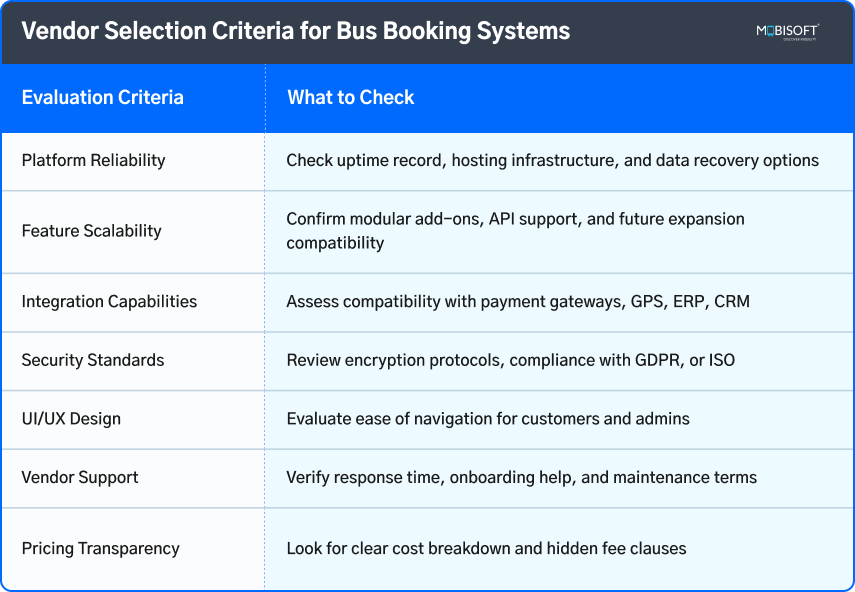
Apply weights based on your priorities. For example: features 30%, pricing 20%, support 20%, compliance 15%, credibility 15%. Multiply scores by weights and rank vendors.
Remember to include a pilot clause in the contract. The pilot should have clear acceptance criteria and a rollback option. That protects you and gives the vendor a clear success target when deploying your online bus booking system or bus operator booking software.
Deployment Checklist: Launch Your Bus Booking Platform
This list gets you from decision to first measurable results, ensuring your bus booking system or bus ticket booking software goes live smoothly.
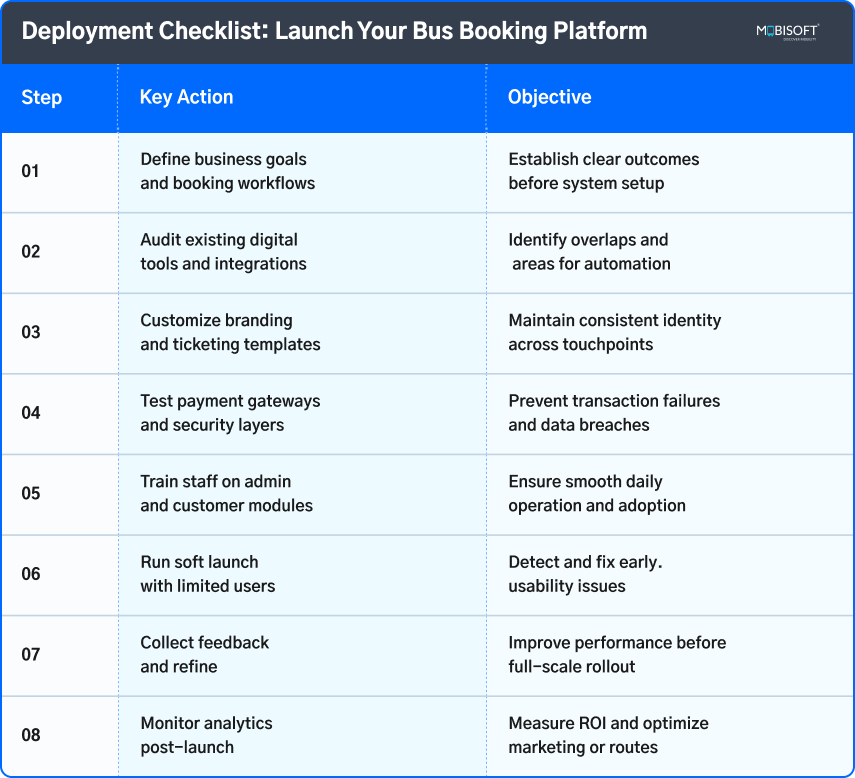
Keep the early cadence tight. Rapid learning beats slow perfection. You will find small process fixes that matter more than large-scale UI changes, especially in an online bus ticket booking system for the travel business.
Scaling Your Transport Business with Digital Ticketing
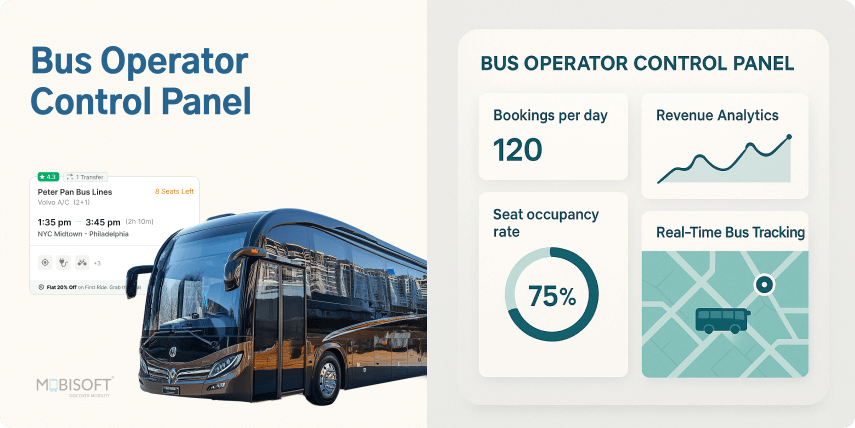
You don’t have to overhaul your entire process to make progress. What matters most is understanding where problems exist, where customers face delays, and how online bus ticket booking software can help solve those issues. A bus reservation software platform is more than just an automation tool for bookings. It helps you create a smarter business that acts, plans, and gains more customer trust with every interaction.
Think of it as moving from reacting to predicting. Instead of chasing manual errors, you can see demand patterns before they form. Instead of scattered data, you get a real-time pulse on your routes, capacity, and customer preferences. That kind of visibility improves performance and changes how decisions are made.
If you’re still trying to decide whether now is the time to go digital, here’s the reality: your passengers are already there. The real question is how fast your bus operator booking system can adapt and take the lead.
Key Takeaways
- Online bus ticket booking systems help you create a smarter business that acts, plans, and gains more customer trust with every interaction.
- An online bus booking software forms the foundation of smooth and adaptable transport services driven by data.
- Choosing the right bus ticket booking system for a travel business requires using a straightforward method to assess reliability, growth potential, and ongoing support.
- Using bus ticketing software for operators with API integration builds partnerships and streamlines work between departments.
- Real-time analytics and automation reshape how transport businesses handle routes, run fleets, and improve the rider’s experience.
- Companies using flexible and well-connected bus booking software platforms secure a solid edge in operations and competition.
- With digital tools, transport teams manage tough tasks more easily and turn daily challenges into growth opportunities.

FAQs
How do online bus booking systems impact operational costs?
They reduce manual labor, printing expenses, and human errors. What’s often overlooked is how automation within an online bus ticket booking system cuts small inefficiencies that drain profit, from delayed settlements to unused seat capacity.
Can such systems handle both B2C and B2B bookings?
Yes. Many bus ticketing systems for operators now support corporate tie-ups, agent dashboards, and white-label solutions. This dual capability helps transport companies expand without adding new infrastructure.
What role does data play in improving ticket sales?
Booking data from a bus booking system reveals patterns most managers miss peak demand hours, frequent refund routes, or loyal repeat travelers. Analyzing these insights helps optimize schedules and pricing in real time.
Why do APIs matter so much in modern ticketing?
APIs make bus reservation software talk to other tools. When your bus ticket booking software connects with GPS, finance, and marketing systems, you gain a single, intelligent control point for operations.
How should a company prepare before implementation?
Start with a clear objective, assign cross-functional leads, and map every current process. The smoother your groundwork, the faster your bus operator booking software rollout succeeds.
What’s the biggest mistake companies make during adoption?
They often overlook staff readiness. Even the smartest bus ticket booking software for travel business fails if conductors or agents aren’t trained to use it confidently.
How do online ticketing tools help customer experience?
They deliver speed, transparency, and consistency. Customers can check seat maps, make secure payments, and receive instant confirmations all through a seamless online bus booking system.
Is digital adoption worth it for smaller operators?
Absolutely. Smaller fleets benefit even more because bus operator booking systems allow them to compete with larger players using automation instead of manpower.

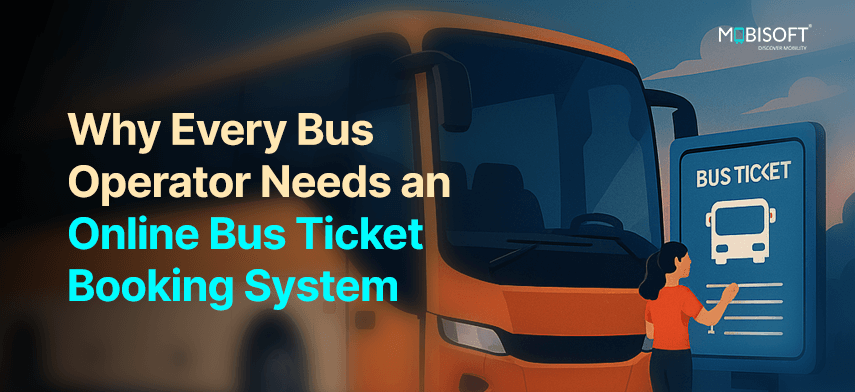


 September 15, 2025
September 15, 2025


